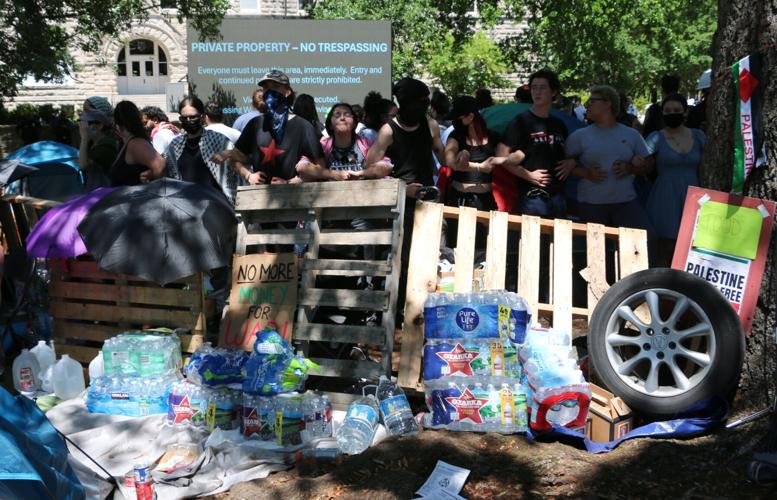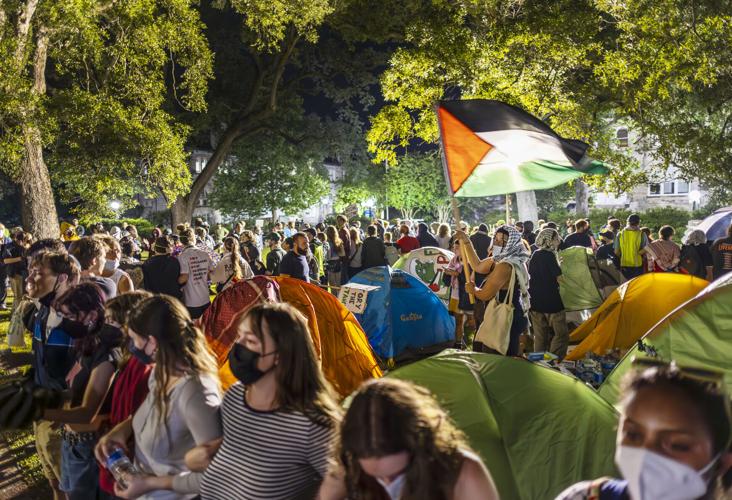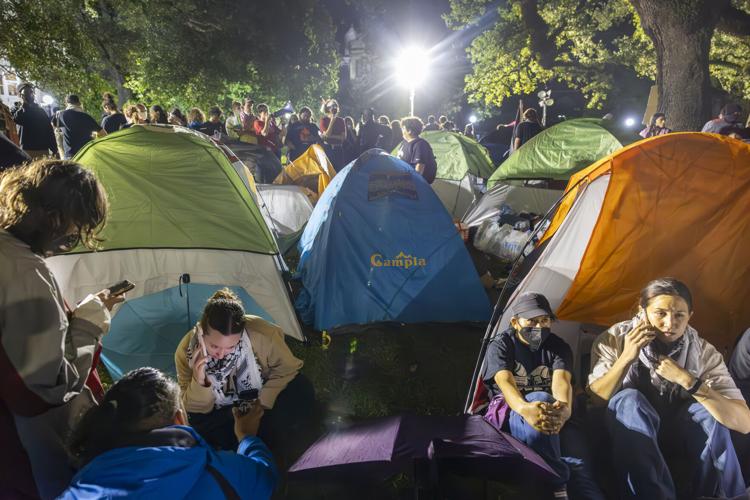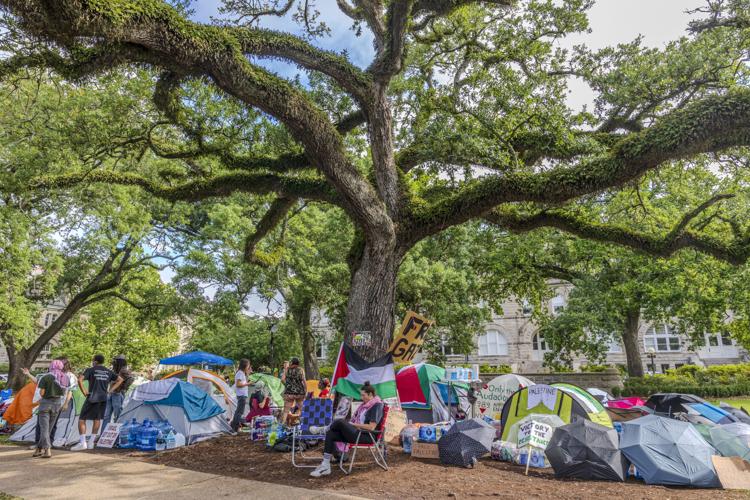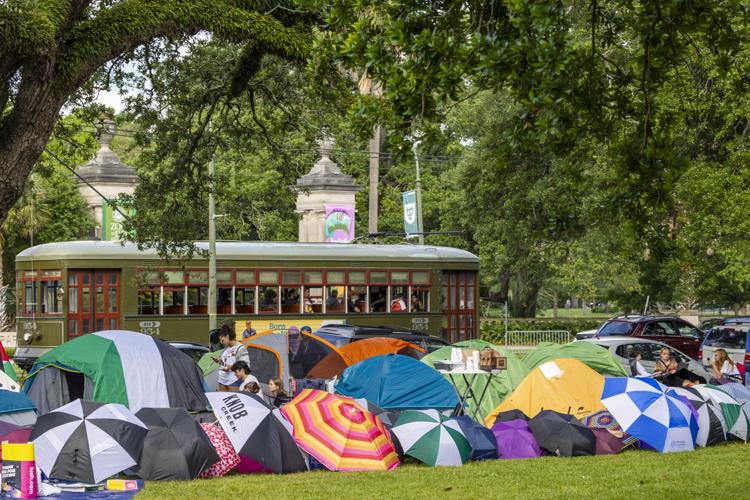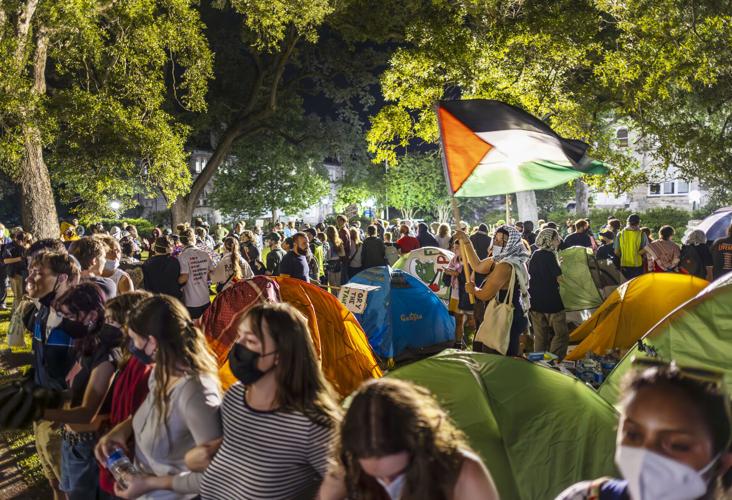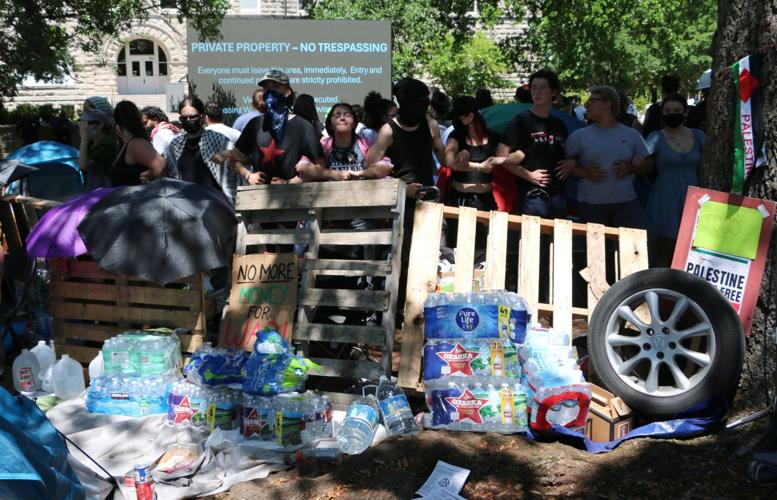Tulane University suspended several students and an activist group Tuesday after pro-Palestinian demonstrators erected tents on the edge of the Uptown campus, where demonstrators remained throughout the day even as police surrounded the small encampment and warned protesters they could face arrest.
The demonstrations at Tulane paled in comparison to the massive encampments and building takeovers at Columbia University and on other U.S. college campuses. At the protest site on a lawn alongside St. Charles Avenue on Tuesday afternoon, a core group of about two dozen protesters had pitched about a dozen tents and formed a circle behind a hastily assembled barrier of wooden pallets, tires and umbrellas, some 24 hours after a march and rally of around 200 people resulted in six protesters — including one student — being arrested on campus following a skirmish with police.
During the day on Tuesday, Tulane police set up metal barricades to block demonstrators from moving farther onto campus. They also wheeled in a large electronic “No Trespassing” sign and blared pop music in an apparent effort to drown out chants, though the encampment remained and more people appeared to be arriving as Tuesday evening wore on.

Tulane University pro-Palestinian protestors get more settled in with water and other supplies along St. Charles Avenue in New Orleans on Tuesday, April 30, 2024. (Photo by Chris Granger, The Times-Picayune)
The university sent a campus-wide email saying officials were “focused on containing and ending the protest” and warning any students who joined that they could be arrested.
As the private New Orleans university sought to contain the mostly peaceful protest while avoiding the mass arrests that have roiled campuses across the country in recent days, Republican lawmakers in Congress ramped up their calls for university leaders to crack down on the demonstrations. On Tuesday, House Speaker Mike Johnson, R-Shreveport, said Congress would expand probes into antisemitism on college campuses, blaming “woke university presidents” for failing to quell the unrest.

Tulane University pro-Palestinian protestors get more settled in with water and other supplies along St. Charles Avenue in New Orleans on Tuesday, April 30, 2024. (Photo by Chris Granger, The Times-Picayune)
At Tulane, dozens of students and alumni signed an open letter Tuesday saying they were “dismayed and disgusted” by the university’s failure to remove the encampment, and some Jewish students said they felt targeted by the protesters.
“I don’t feel safe here,” said Yasmeen Ohebsion, a Tulane senior and a Jewish student leader who said many of her peers also were afraid.
Meanwhile, supporters of the demonstration stood on the sidewalk cheering on the protesters and chanting, “Resistance is justified while Palestine is occupied.”
“We’re not going to leave until our demands are met or they mass arrest us,” Vonne Crandell, a Tulane senior said earlier Tuesday. He was one of at least five students the university said it suspended for participating in the “unlawful protest,” with additional suspensions “forthcoming.”

Tulane University pro-Palestinian protestors are set up with tents and umbrellas along St. Charles Avenue in New Orleans on Tuesday, April 30, 2024. (Photo by Chris Granger, The Times-Picayune)
The protesters — who include students from Tulane and neighboring Loyola University, along with activists unaffiliated with either school — have made several demands of the universities. They want both schools to sever financial ties with Israel and denounce the war in Gaza, which began after Hamas militants attacked Israel on Oct. 7.
Across the country, as university leaders face competing demands — to either clamp down on protesters or support their free speech rights — they have taken different approaches. Some have called in the police, leading to arrests and sometimes violent confrontations, while others have tried to ease tensions.
Elements of both strategies were on display Tuesday in New Orleans. Tulane officials have said they were planning to contain the encampment, but have threatened students with arrest and suspended the campus chapter of Students for a Democratic Society, which has helped organize the protests.
Loyola President Xavier Cole said in a campus-wide letter he understood “why many in our community are hurting and feel called to action” and acknowledged “everyone’s right to free speech.” He also said forcefully that any Loyola students on Tulane's campus were trespassing and urged them to leave, offering to provide protesters a police escort back to Loyola “without repercussions” for joining the demonstration.

Pro-Palestinian demonstrators gather in front of Tulane University in New Orleans late at night on Monday, April 29, 2024. (Photo by Chris Granger, The Times-Picayune)
Meanwhile, Tulane President Michael Fitts faced pressure Tuesday to shut down the pro-Palestinian protest from some members of the Tulane community.
“Tulane is currently letting agitators and outsiders run amok on its campus, and has bent to the will of the mob, allowing these protests to disrupt classes the last week of school," read the open letter written by sophomore Nathaniel Miller and sent to Tulane leaders and elected officials. Miller was one of several counter-protesters who gathered near the encampment Tuesday, some waving Israeli flags.
But even as police patrolled the encampment and the university issued warnings, the authorities had not shut down the protest by by Tuesday evening.
“They haven’t arrested anyone yet,” said Loyola sophomore Juleea Berthelot, one of the protesters, in regards to the standoff on Tuesday. “They haven’t even tried.”

